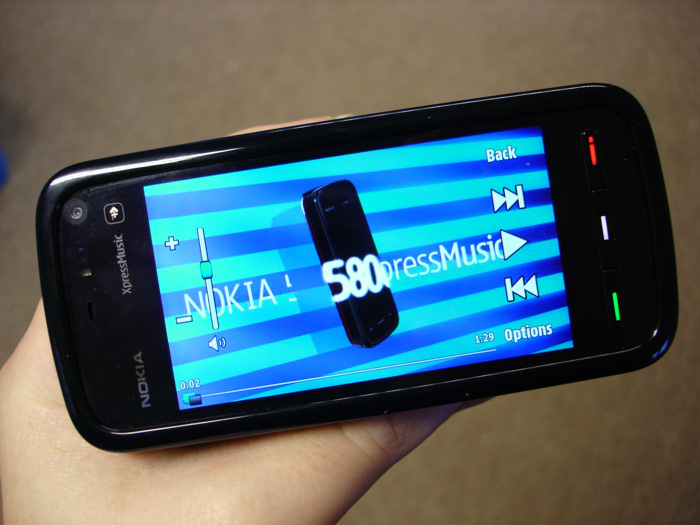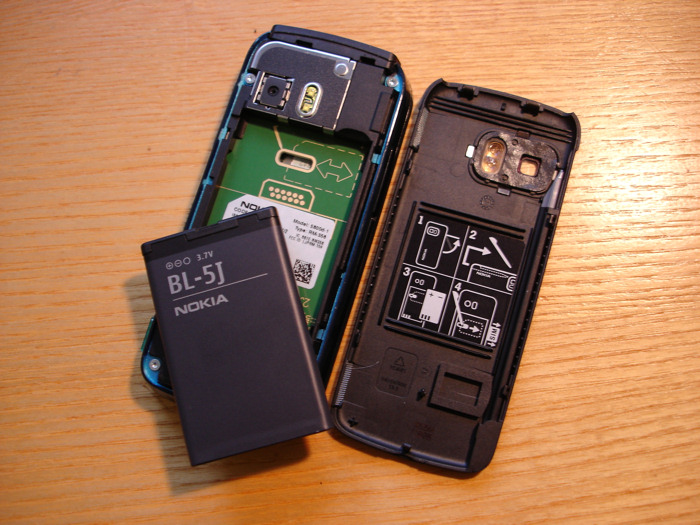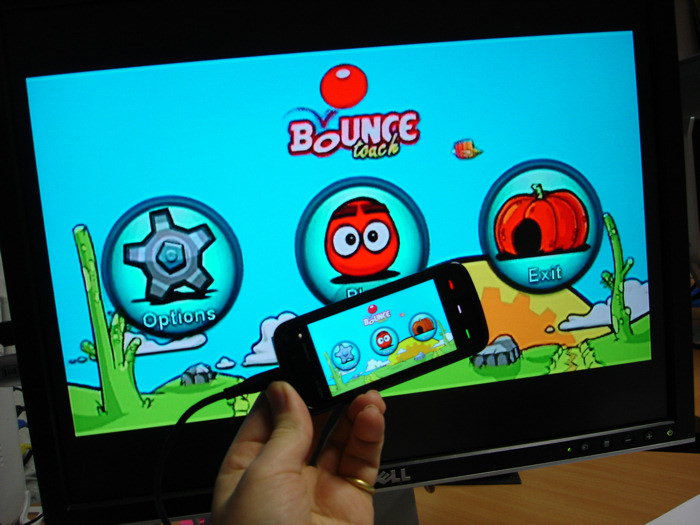Click here for a complete list of All About Symbian's Nokia 5800 XpressMusic tutorials

First steps with the Nokia 5800
So, you've bought a 5800 and got it home from the shops? Or perhaps you've got a 5800 ordered in the post and it's just on its way to you?
Well, don't do ANYTHING more until you've read our guide to your first steps with the 5800. Don't even switch it on yet! :-)
Are you ready? Here we go...
1. Check you've got everything you paid for
The 5800 comes with various bits and pieces included in the box, it's important to make sure you have them all as soon as you buy the phone.
Note that accessories may vary from region to region, and network-locked models may also have different sales packages. The following list is what comes with the standard European unlocked 5800:
- The Nokia 5800 XpressMusic phone (probably covered with stickers to protect the screen and camera during transit)
- Two styluses (one is inserted in the bottom right corner of the phone, the other is a spare in the box)
- A flexible plastic protective case
- Official Nokia BL-5J battery
- Official Nokia charger
- Standard microUSB cable
- A microSD memory card, possibly already inserted into the phone's card slot (the storage size of the card may vary, but ours came with an 8 gigabyte capacity)
- 3.5mm headphones in two pieces, with a playback control panel in the middle
- 3.5mm TV Out cable
- A foldable stand for propping up the phone while watching videos, with a cord for attaching it to the phone
- A plectrum for use as an alternative to the stylus, with a cord for attaching it to the phone
- A quick start booklet
- Printed manual
- Mini-DVD with software for PCs
If anything gets lost or broken, see our special tutorial on what comes with the 5800's sales package and how to replace anything that's missing.
2. Charge the 5800 until it's full
Take the phone and battery out of their wrapping, and insert the battery making sure that its holes match up to the prongs in the phone. If you're unsure how to do this take a look at the quick start guide that comes with the phone.
(Long-time Nokia users may be surprised to see the "wrong" side of the battery facing outwards, but don't worry, it is meant to be that way round.)
When you've got the battery inserted properly and snapped the casing back on, attach the charger and plug it into the mains. You can use any Nokia charger with an appropriate-size pin, though different types of Nokia chargers fill the battery at different rates (if you look on the charger you will see a "mA" number, this is higher in chargers that charge faster).
Now to kill a couple of myths:
- You do NOT need to empty the battery before charging!
- You do NOT need to charge the battery for 24 hours on first use!
There are many misconceptions from the days of older types of batteries which suffered from the "memory effect". Modern lithium phone batteries work in a much more flexible way, and do not require any special treatment when first used.
Batteries do eventually wear out of course, but you should be able to get a couple of years use from a brand new phone battery.
Charging the battery usually takes a couple of hours if it's close to empty. After you've fully charged the battery you can insert your SIM card (there are illustrated instructions in the Quick Start guide), and then turn the phone on with the power switch on the top of the phone.
Incidentally, if you want to remove your SIM card there are instructions on how to do this beneath the battery, basically just use the stylus to nudge it out of the slot.

3. Update the phone's firmware
You can find out more about this in our firmware update tutorial:
How to update the firmware on the Nokia 5800 XpressMusic
4. You may want to switch off the automatic screenlock
Don't panic if the phone screen goes totally black and doesn't respond to touch!
By default the 5800 dims its screen and locks itself within a certain time limit. This is to stop it being accidentally pressed if you put it in your pocket, and the screen being off saves battery life. The phone itself is still running, it just doesn't respond to touch while it's locked.
You can easily unlock the 5800 by just flicking the unlock switch in the middle of the phone's right side. Flicking the switch again locks the screen and dims it. The switch is there for when you want to put your phone in a pocket or bag.
If you want to switch off this automatic locking, do the following:
Press the white menu button, select "Settings", select "Phone", select "Phone Management", select "Auto Keyguard", select "None". Press the red button to get back to the front page.
Once the automatic keyguard is off, you can still lock the phone manually by flicking the switch. You can also put the keyguard back on using the instructions above.
5. You may want to switch off the touchscreen vibrations
By default the 5800 vibrates slightly when you touch the screen. If you find this annoying, you can switch it off by doing the following:
Press the white menu button, select "Settings", select "Personal", select "Profiles", select "General" (or whatever profile you normally use), select "Personalise", select "Touch Screen Vibration", select "Off". Press the red button to get back to the front page.
You can switch it back on, or vary the level of vibration, by the same method.
6. You may want to switch off Automatic Screen Rotation
Like many smartphones, the 5800 automatically goes into horizontal mode when it's held horizontally, and vertical mode when held vertically.
If you prefer to have your 5800 stay permanently in one mode, click here to see our tutorial on how to switch off Automatic Screen Rotation.
7. Copying your SIM card's contacts onto the phone
The 5800 stores its contacts in the phone's own memory. If you have contacts stored on your SIM card, you may want to copy them over to your 5800's contacts list.
In theory the 5800 may ask you if you want to copy your contacts automatically, but if it doesn't here's how to do it manually:
On the phone's front page, press the Contacts icon (the grey button on the right at the bottom of the screen). Select "Options", select "Settings", select "Contacts To Display", tick the "SIM memory" box (and make sure the "Phone Memory" box is ticked too), select "OK", select "Back".
You should now be back to the contacts screen, and all your SIM card's contacts will be visible. To copy them into the 5800's memory: select "Options", select "Mark/Unmark", select "Mark All", select "Options", select "Copy", select "Phone Memory".
You should now see all your SIM contacts listed a second time, because they're also in the phone memory. If you find this doubling up to be confusing, you can hide the SIM contacts by doing the following: select "Options", select "Settings", select "Contacts To Display", untick the "SIM Memory" box (but make sure the "Phone Memory" box is still ticked), select "OK", select "Back".
And voila, you have all your SIM card's contacts now transferred to the 5800's memory.

One of the 5800's nicest functions, TV Out, lets you use the phone on a standard television set
8. Try out the phone's various functions to make sure they work properly
Now here comes the fun part: explore and use as many of your 5800's functions as possible, to verify that they work.
It's important to do this as soon as you buy a phone, because if something is broken straight out of the box you should let the shop you bought it from know about it as soon as possible.
The 5800 is a multitasking S60 smartphone, and you can access its main menu by pressing the white button on the front of the phone. You can run several applications at once, and switch between them at any time by holding down the white button.
If you ever get lost or stuck on a phone, you can get back to the front page (also called the "standby screen") by pressing the red button.
9. If you have problems...
If the 5800 is broken or if there's something missing from the sales package, contact the shop you bought it from straight away. It's important to make contact as quickly as possible, because many countries' consumer laws offer you added protection when problems appear a short time after purchase. Purchasing phones with a credit card may also offer added protection.
Missing items and phones that are broken on delivery are generally the responsibility of the shop, and they should normally repair or replace anything in those circumstances.
Problems that happen on the phone after a period of use are generally the responsibility of the manufacturer, and they usually have a 1 or 2 year guarantee during which they'll repair or replace phones which break down. Within the European Union there's normally a 2 year guarantee on all Nokia phones, and this guarantee is valid across the entire EU (so for example if you buy a new Nokia phone in Germany and then move to France, the guarantee is still valid in France). In non-EU countries the guarantee period and terms may vary.
If you think Nokia should repair or replace your phone, the first step is to contact your local Nokia "care point". You can do this by going to Nokia.com, selecting your local website, then clicking on the "Get Support" link at the top, then clicking on "Repair". Your phone shop should also be able to direct you to the nearest care point.
If you need help and advice with the 5800, go to nokia.com and click on the "Get Support" link, or alternatively visit All About Symbian's 5800 forum by clicking here.
10. Buying accessories for your 5800
As mentioned above, you can use third party headphones with the 5800, and in fact we here at AAS would recommend this. Nokia's own headphones aren't always the best, and third party manufacturers which specialise in audio equipment often produce much better ones. As long as they have a standard 3.5mm jack they will work with the 5800.
Third party memory cards are also fine, the 5800 can officially support microSD/microSDHC cards up to 16 gigabytes in size (and unofficially it may cope with even larger cards). Cards made by major companies like SanDisk and Kingston are just as reliable as Nokia's own-brand cards. If you are going to buy a card, try to buy it new from a reputable shop. Try NOT to buy memory cards from online auction sites, as there's a risk of getting counterfeit cards that don't last very long.

The top of the 5800: the power button, charging jack, 3.5mm jack and microUSB port
Click here for a complete list of All About Symbian's Nokia 5800 XpressMusic tutorials
